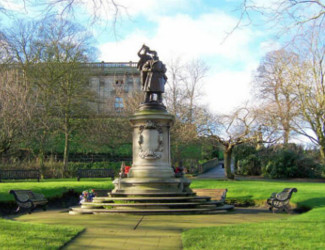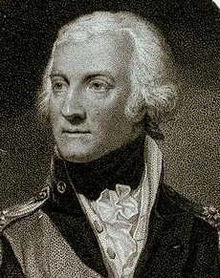To provide you with the best experience, cookies are used on this site. Find out more here.

To provide you with the best experience, cookies are used on this site. Find out more here.

To build your own Itinerary, click  to add an item to your Itinerary basket.
to add an item to your Itinerary basket.
Already saved an Itinerary?


You are here > Ideas & Inspiration > Famous People > War Heroes
Take a minute or two to admire our superb war heroes who fought for our country.
Captain Albert Ball VC, one of the Royal Flying Corp’s most famous ace during World War I, was born the son of a successful Nottinghamshire businessman in the suburb of Lenton on 16 August 1896. He spent his childhood years here where he attended a variety of schools, including Nottingham High School, before completing his education at Trent College from 1909 to 1913.
On 4 August 1914, Britain declared war on Germany and by September that year 18 year old Ball was enlisted with the 1st Platoon, 2/7 Battalion (Robin Hoods), Nottinghamshire and Derbyshire Regiment. Within a month he had reached the rank of Sergeant, and was quickly made a Second-Lieutenant to his own battalion.
After investing his own time and money in to flying lessons he joined the Royal Flying Corps in 1915 and in January 1916 he was awarded his wings. The following month Ball was sent to France where his natural ability for flying single-seat fighter aeroplanes and an instinctive aggression was soon identified.
Albert recorded 44 victories against Germany, although it is believed there were many more not documented. He is thought to have achieved a staggering 77 whilst fighting for King and country which he would go on to receive many accolades for.
In June 1916 Albert was awarded the Military Cross, shortly followed by the Distinguished Service.jpg) Order (DSO) and two bars – the first person in the British Army to be so awarded. He returned home later that year and was proclaimed a national hero. He was invited to Buckingham Palace to be invested with the DSO and Bar, and MC. Just a week later he was gazetted with further Bar to his DSO, making him the first triple DSO.
Order (DSO) and two bars – the first person in the British Army to be so awarded. He returned home later that year and was proclaimed a national hero. He was invited to Buckingham Palace to be invested with the DSO and Bar, and MC. Just a week later he was gazetted with further Bar to his DSO, making him the first triple DSO.
On a return visit to his home city Albert Ball was admitted as an Honorary Freeman of the City of Nottingham, in recognition of his service as an Officer of the Royal Flying Corps and as a mark of appreciation for his bravery in the face of the enemy.
Captain Albert Ball made his final flight on 7 May 1917 as part of an eleven strong hunting patrol. It was a very cloudy day but he was seen by many observers to dive out of a cloud and crash where he died minutes later. The cause of Albert’s crash was never adequately accounted for as there were no bullet wounds to be found and only minor bruises to his face. He was buried with full military honours two days later in Annueullin cemetery, France.
His achievements continued to be recognised after his death as he was awarded the Victoria Cross on 8 June 1917 and France admitted him as a Chevalier de la Legion d’honneur. A memorial service was then held at Nottingham’s St Mary’s Church on 10 June 1917 where the streets were filled for the memorial service procession. Albert’s accomplishments were so recognised that King George V visited the city on 22 July 1917 where his parents were presented with his Victoria Cross in an official ceremony at The Old Market Square.
A memorial fund was set up by the City Council in honour of its favourite son and on 8 September  1921 a monument of Ball was unveiled in the grounds of Nottingham Castle - where it still stands today. The Castle is also home to Ball’s Victoria Cross, as part of the Sherwood Forester Regiment display. There are a number of other memorabilia at the Castle and other sites including the Museum of Nottingham Life at Brewhouse Yard.
1921 a monument of Ball was unveiled in the grounds of Nottingham Castle - where it still stands today. The Castle is also home to Ball’s Victoria Cross, as part of the Sherwood Forester Regiment display. There are a number of other memorabilia at the Castle and other sites including the Museum of Nottingham Life at Brewhouse Yard.
Nottinghamshire lad Albert Ball was young, handsome, modest and brave – the epitome of a fighter ace. His death in combat at such a young age was a tragic one but his legacy lives on as one of the most daring, skilful, and successful pilot the Royal Flying Corps ever had.
Richard Howe was born the fourth Viscount Howe in 1726. He joined the Navy aged just 14. By 20, he had risen to the rank of Captain. Credited with firing the first shots of the Seven Years War, he's best remembered for his victory over the French fleet in the battle of The Glorious First of June” in 1794. He earned the dubious nickname "Black Dick" because he was rumoured never to smile unless a battle was about to begin.
Lord Nelson called Lord Howe a "great master in tactics and bravery". Lord Howe's key achievements included the Battle of Long Island (1776), The Battle of White Plains (1776) and becoming Member of Parliament for Nottingham (1758).
Admiral Sir John Borlase Warren was born in Stapleford, Nottinghamshire and was the son  and heir to John Borlase Warren. Sir John made his name in the Royal Navy, starting when he entered as an able seaman in 1771. By 1774 he was a member of Parliament, representing Great Marlow. In 1775 he became a Baronet (hereditary title awarded by the British Crown).
and heir to John Borlase Warren. Sir John made his name in the Royal Navy, starting when he entered as an able seaman in 1771. By 1774 he was a member of Parliament, representing Great Marlow. In 1775 he became a Baronet (hereditary title awarded by the British Crown).
In 1777 his naval career took off, as he was awarded the command of his first ship and then in 1794, he assisted in the blockade of Brest as Commodore of a frigate squadron off the French coast. His success at sea continued in the following years with more naval successes.
In 1802, Sir John was sworn onto the Privy Council. His sea legs didn't desert him however, as he was instrumental in yet more historic moments such as the capture of a French warship named the Marengo at the Action of 13 March 1806 - a naval engagement in the Napoleonic Wars. In 1810 he took the prestigious title of Admiral and continued to be a pivotal figure in the Navy as commander-in-chief at the North America Station; commanding the UK's naval forces in North American waters. He died on 22nd February 1822. Today, there is a statue in his honour in the grounds of St Mary's Church in the Nottinghamshire village of Attenborough. There's also several pubs in the Nottinghamshire area which are named after him.
© Visit Nottinghamshire 2025. All Rights Reserved






